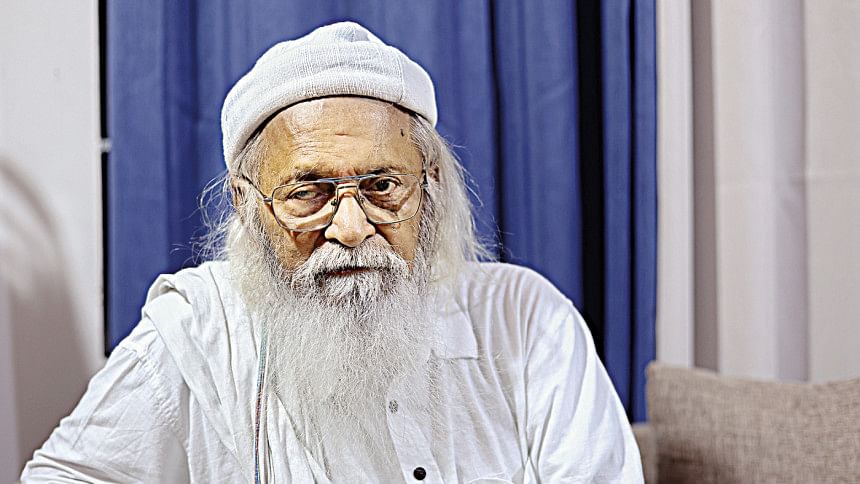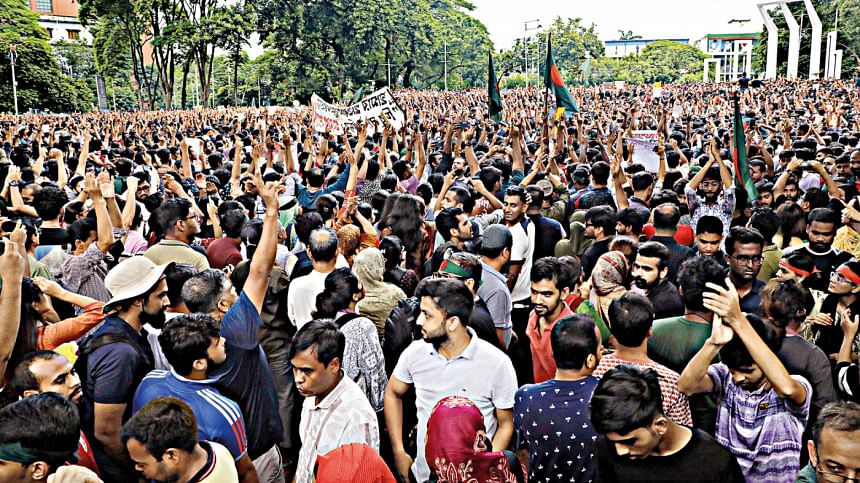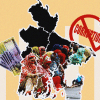“Reform must come from the people”

The Daily Star (TDS): Could you offer your reflections on the 2024 uprising, particularly in comparison to the 1969 Mass Uprising and the 1990 Anti-Authoritarian Movement?
Farhad Mazhar (FM): The 1969 Mass Uprising was primarily focused on achieving either provincial autonomy or independence, which ultimately led to the Liberation War in 1971. At that time, we demanded a provincial government based on the Six Points, advocating for Pakistan to become a federal state where East Pakistan could enjoy greater autonomy. This demand transformed into a call for independence following the Pakistani Army's brutal Operation Searchlight on March 25, 1971. The 1969 uprising was fundamentally about political and economic autonomy and later the creation of a new nation.
In contrast, the mass movement of 2024 is centered around state-building based on popular sovereignty. Its core aim to dismantle the existing fascist state and the structures of authoritarian and fascistic power by organizing the people as the central political force. This movement seeks to launch a constitutive process to draft a new constitution based on the will of the people. Thus paving the way for the establishment of true democracy—a fundamentally different kind of state power and governance. It's important that the movement also aims to deconstruct and dismantle the false ideology of election as democracy. Elections are merely mechanisms for practicing democracy, and what we need is to install the democratic state first and practice election as a decision making process at various levels of state craft as required by the constitution. When a democratic state is installed, elections are important to its functioning and remain akin to the will of the people.
In Bangladesh, however, elections have often been equated with democracy, which is a misconception and the major ideological challenge for the people's movement that we have been facing for long time. Elections alone do not ensure democracy. We often fail to learn from history that fascist regimes rose through elections and constituted as fascist power based on nationalism and populism. In the absence of a powerful ideological struggle against nationalisms and various undemocratic religious and secular tendencies, so called election as democracy ends up in populism and fascism, as we saw in Europe in the past. We must learn from Germany, Italy, Spain, Chile, and now from India. Hitler, Mussolini and Sheikh Hasina all came to power via elections. Those advocating for elections and preaching election as democracy in the current context of Bangladesh are, in effect, perpetuating fascism because they are pushing for the continuation of authoritarian rule under the guise of electoral legitimacy.
TDS: What steps should be taken to initiate the process of drafting a new constitution?
FM: First, we must declare the existing constitution null and void. Dr. Mohammad Yunus, as Chief Adviser of the interim government, is advising President Mohammed Shahabuddin Chuppu, who was appointed by the fascist regime and served under the fascist government. This indicates that the mass uprising remains under the legal and constitutional mechanism and control of the fascist power. Did people sacrifice their lives for this outcome? Therefore, the first step is to declare a new president reflecting the sovereign will of the people firmly based on the political and legal paradigm of popular sovereignty, annul the existing constitution, and remove Mohammed Shahabuddin.
Second, we must review the top army officers appointed by Sheikh Hasina. If it is found that they remain loyal to her or Tarique Siddique rather than the people of Bangladesh, they must be removed. Should the Army Chief choose to support the people, he must show a positive attitude, as there were moments when soldiers refused to fire on civilians. Many in the army demonstrated solidarity with the people, forming a new alliance among students, citizens, and soldiers. This is the essence of people's power.
Dr. Yunus or a similarly chosen figure should be appointed as head of state. Afterward, the president must undertake two crucial tasks. First, he must ensure Bangladesh operates under existing laws and regulations, except for those that are colonial, enacted by Sheikh Hasina, or violate human rights. Examples include the Digital Security Act (DSA), laws regarding the RAB, or the colonial-era Code of Criminal Procedure (CrPC). We may proclaim that any law that violates the international human rights regimes will be considered null and void and the state will function as it is functioning now, until we draft a new constitution.
The people are not an abstract entity but rather possess a deep political understanding in their own way, not necessarily adhering to the expectations of the educated elite. A National Constitution Council will draft the constitution based on the suggestions proposed by the people, which will later be legitimized by an elected National Constituent Assembly. Our aim is to create a charter founded on human dignity, equality, and social justice.
Finally, the president must declare an interim period to draft a new constitution. The political parties and the people must give him time to begin this work. The interim government must provide ample space for political parties free from fascist ideology and practice, to participate at all levels of discussions. Elections should be held for a constituent assembly rather than simply a regular election to elect government. This process should begin with local-level meetings—at the division, upazila, or even union level—where people can voice their vision for the state and their expectations. Political parties, too, will present their ideas for the nation's future.
The people are not an abstract entity but rather possess a deep political understanding in their own way, not necessarily adhering to the expectations of the educated elite. A National Constitution Council will draft the constitution based on the suggestions proposed by the people, which will later be legitimized by an elected National Constituent Assembly. Our aim is to create a charter founded on human dignity, equality, and social justice.
Many might think that I am an ultra-leftist, convinced by the Bolshevik model, but our reality is quite distinct from that of Russia. Instead, we may look at China as our economic model, if not for the political ideals. We are in dire need of economic development that has been thwarted by the new liberal capitalist global order, dominated by few transnational corporation. We must free ourselves from old petti-bourgeois utopian socialist ideals that breed underdevelopment and fascism. We must invent policies that promote accelerated economic transformation and secure for us a strong economic position in the international division of labor. So we have a very challenging task to engage with global capital and globalization that is not possible by conventional economic ideologies and externally prescribed economic policies. We cannot remain perpetually poor and deprived of technology. We must find ways for the transfer of science, technology, the art of management and efficient governance and appropriate social relations and forms to remain cohesive and strong. As you know, China rapidly advanced toward economic development immediately after 1976, and it is quite possible that we could similarly develop ourselves within a very short period of time.
We are rich in natural, biological, aquatic and human resources that accompany historically accumulated local knowledge system. These will be the key to our massive economic upheaval. Once the people are convinced that they are part of a massive state and nation-building project the people's revolution will be able to realize the aspiration of the people. We are an emerging political community endowed with powerful political agency, pragmatic ambitions and a clear goal to chart a path for ourselves in the global economy. No one could stop Bangladesh to emerge as a powerful country. People are willing to sacrifice their lives for their dreams and ambitions. We have seen that in the July Revolution.

TDS: Do you see any significant changes in the post-uprising period?
FM: The anti-fascist spirit remains strong and active among the people. As an activist intellectual, my main focus is to sustain that intense desire for societal transformation and facilitate dialogue with others. I am not alone in this revolutionary passion; many others share the same drive.
Democracy, at its core, depends on the collective will of the people, as seen in constitutional preambles like "We, the people of the USA" and "We, the people of Bangladesh." It's crucial to emphasize that the people have agency. They are not apolitical; through their united action, they overthrew the fascist regime. However, it's also true that some individuals supported the fascist regime.
This brings up the need for a Truth and Reconciliation Commission (TRC), akin to the one in South Africa after the anti-apartheid struggle led by Nelson Mandela. Such a commission should have been established right after the people took control of state power in Bangladesh. The urgency for a TRC stems from the fact that not all Awami League supporters are fascists; some are genuinely committed to democracy.
Amidst all of this, we tend to overlook critical questions, such as the nature of heinous institutions like Aynaghar, about which we still know a very little as citizens.
And why isn't Dr. Yunus engaging in dialogue with civil society? While we recognize his contributions, he must also listen to the people, otherwise it will eventually damage his acceptability. The state is a political entity with complex processes that require broad engagement.
TDS: How do you foresee the South Asian political landscape evolving in light of the recent developments in Bangladesh?
FM: Our relationship with India differs significantly from our ties with the USA. Unfortunately, the interim government lacks experts who fully understand these geopolitical nuances. A faction within Delhi's foreign policy circles, including the BJP, perceives India's bilateral relationship with Bangladesh is based on a flawed premise. Instead of people-to-people relations, India maintained relations as a state to the individual leader of a fascist regime. That's wrong.
Despite these challenges, we must work towards establishing a constructive and positive bilateral relationship with the people of India, considering the geopolitical subtleties and regional dynamics. We need to approach this with political acumen, clearly identifying which aspects of India's policy we support and which we oppose. It's crucial to bridge the gap between the people of Bangladesh and India, especially to counter any misconceptions about the treatment of minorities in Bangladesh.
As someone who engages closely with students concerned about the country, I haven't noticed any baseless or irrational anti-Indian sentiment among them. The dissatisfaction many Bangladeshis feel is largely due to India's perceived injustice and oppression towards its Muslim population, which is understandable. Additionally, India's refusal to shelter Muslim refugees contrasts sharply with our own acceptance of Rohingyas. To alleviate this discontent in Bangladesh, India needs to address its treatment of Muslims within its borders. Continued aggression will have negative repercussions for India.
From a broader perspective, our goal is to live peacefully within the subcontinent, which is a fundamental principle. However, if India maintains its current stance, it could provoke and intensify anti-Indian sentiments in Bangladesh, potentially mobilizing forces against India. This would place responsibility squarely on India. Policymakers must therefore work to prevent such outcomes.
TDS: There is much talk about political reforms. What are the essential steps to achieve genuine reform?
FM: The people of Bangladesh must understand that we cannot rely on external help; no one will come to our rescue. We need to build a genuine consensus among the populace to move forward effectively. Herein lies my fundamental disagreement with our political parties. They may profess a commitment to reform, but they are not equipped to drive real change. Reform must come from the people, with political parties providing support rather than leading. Had the political parties acted responsibly, we wouldn't be in this crisis today. Political parties are not above the people, which they often imagine and try to impose; they are an extension of the people and their existence depends on the people.
We should consider forming a Reconciliation and Reconstitution Council that includes political parties. Our role would be to engage in discussions with them while respecting the interim government's responsibilities—interference should only occur if the government acts against the will of the people. Additionally, we must confront any remaining fascists within the bureaucracy, police, and army. Political parties should encourage their members to support the authentic path to democracy. This process should be completed hopefully within a year, as our goals are clear.
Engaging the public will naturally involve political parties. By establishing committees at the Upazila level, we ensure their inclusion. Integrating political parties is essential for building a new state. We should facilitate discussions and possibly hold seminars to gather ideas and solutions, as this is a collective issue that transcends any single party. Our aim is to resolve these issues swiftly.

TDS: It seems the interim government is not adequately addressing the people's demands, and there is a perceived void, as political parties are claiming that this government has not provided a clear roadmap. How do you evaluate the situation?
FM: It's unjust to place the responsibility for creating a roadmap solely on the interim government. The initiative should come from the political parties themselves. Why are the political parties failing to put forward their own roadmap? It's contradictory to expect the interim government to provide a plan while leaving the task of reform to the political parties.
I've published seven critical articles on the BNP's proposals for state reform, which are available on my website. None of the BNP members have contested my views. If political parties refuse to listen to public feedback and dismiss criticism while demanding a roadmap from the government without offering their own, how can they claim to be a legitimate agency to lead the people? They need to outline their plans to the people, earn their trust, and secure their votes.
Furthermore, we still have bureaucrats who were involved in significant corruption and remain loyal to the Awami League. Why haven't we replaced them? What's stopping us from promoting capable young bureaucrats aged 30 to 32? If they are competent, why not consider them for senior positions like secretary?
TDS: How does the July movement stand to shape narratives related to the 1971 Liberation Movement?
FM: The independence movement of 1971 is a non-negotiable issue! It clearly and historically marks us as a political community different from Islamic Pakistan, and in 1947 we marked ourselves as different from Hindu India. I fundamentally reject the prevailing narrative about the events of 1971.
It's crucial to differentiate between independence and liberation. Liberation involves the creation of a politically empowered community, whereas independence merely signifies control over territory without fully realising statehood and its essential structures. Collective self-consciousness as the driving historical agency is not easy to achieve and realize. This is why I am so keen on literature, art, culture and the critique of theology and traditions. So I squarely place emphasis on the appropriate articulations between Bangla language, Bangla culture, pre-Islamic history and the religions. To progress, we must challenge the conventional Awami League (AL) narrative that 1971 was the culmination of our journey. No. It is only the beginning. We must integrate the golden history of Islam both in its place of origin and its arrival in the subcontinent and contribute to building powerful foundational imaginations and structures in our own language, and culture integrating the traditions and legacies we carry within us from pre-Islamic era. We must cultivate a critical, historical and creative mind that keeps us united and altered to our collective self-consciousness as the agent of world history, and not slaves of colonial, imperialist ideologies and power.
The intellectual shortcomings of the Awami narrative become apparent when we consider the constitution's adoption, which was driven more by the preferences of lawyers and bureaucrats than by the general will of the people formed by the collective self-consciousness as I discussed earlier. The Constitution is not a legal document, as naive lawyers usually think. To constitute is the most important political act through which a political community arrive to world history and contributes to the collective good of humanity and world history and planetary survival as a life form.
The core demands of the 1971 movement—equality, human dignity, and social justice—must now be actively pursued. Following the July uprising, Bangladesh has the chance to advance towards these goals. At this pivotal moment, we must address issues related to laws, culture, tradition, religion, and history to move forward effectively. Most importantly, we must learn to imagine ourselves as a unique political community and our existence is not negotiable.
The interview was taken by Shamsuddoza Sajen of The Daily Star.

 For all latest news, follow The Daily Star's Google News channel.
For all latest news, follow The Daily Star's Google News channel. 










Comments